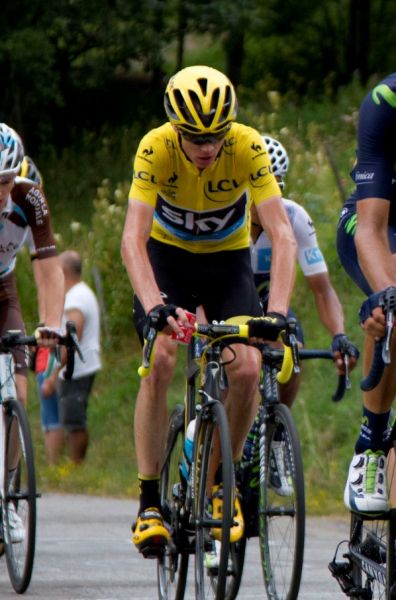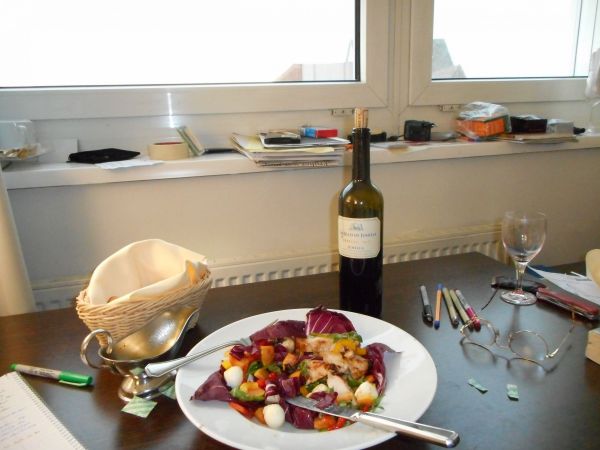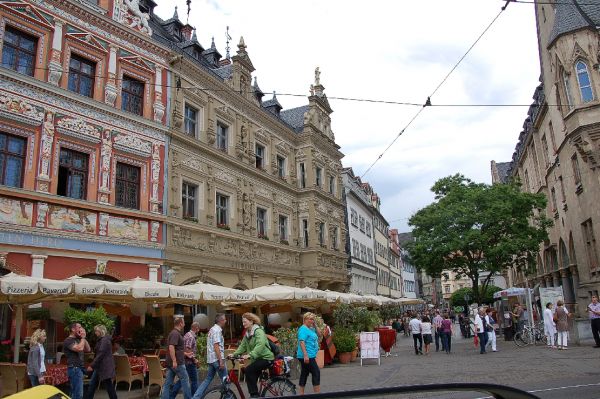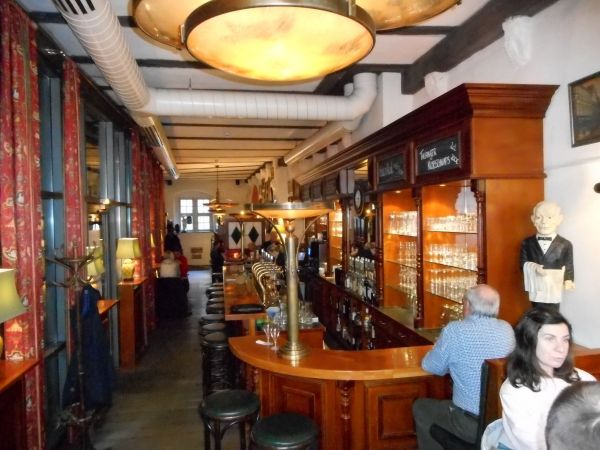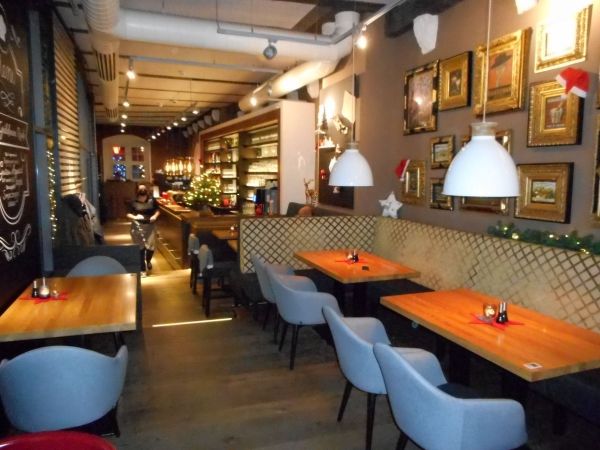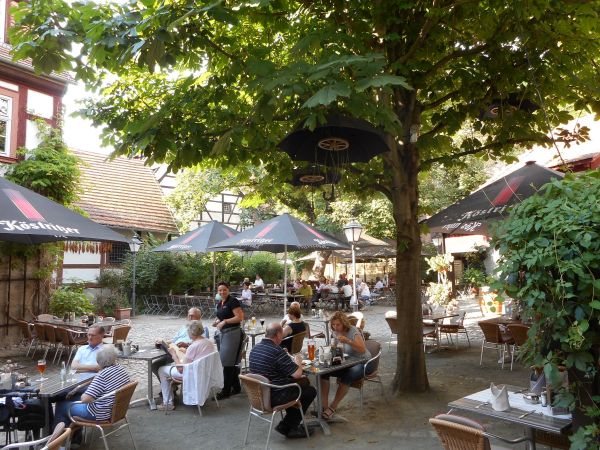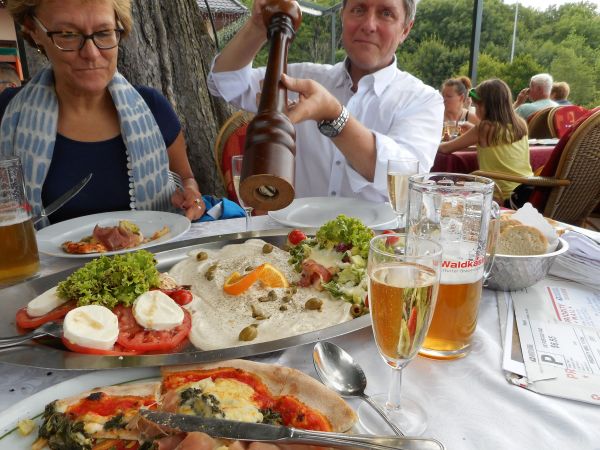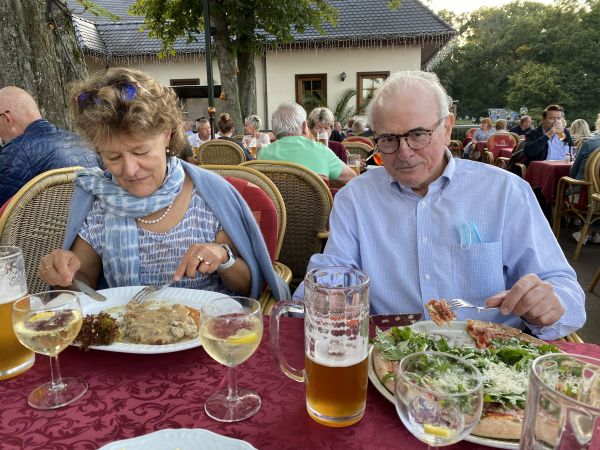Meals in Erfurt
During the Summer of 2015, I spent an evening eating supper in my hotel room in Erfurt, Germany, so that I could watch the Tour de France, and see the Briton Chris Froome successfully defend his Tour de France title. He makes a curious figure on a bike, pale, skinny arms and legs, and his head moving like a bobble-headed doll. Froome has said that, during a race, he does not notice it.
Delirious fans mob the cyclists on the steep slopes of the Pyrenees and usually cause an accident or two each year. Dozens of bicycles litter the side of the road, meaning that many of the fans ride up the steep road before the racers get there. Next to the FIFA World Cup, the Tour is the most popular sporting event on the planet. I disagree with Lance Armstrong's book It's Not About the Bike. It is about the bike! While Americans typically drive a car to work, much of the world still depends on a bicycle.
As I sat there in my hotel room watching the Tour, I realized I was also enjoying supper; so I took a photograph of it: strips of roasted chicken in a salad consisting of radicchio, watercress, arugula, and roasted peppers—called Paprika in German—with baguette and butter. Germans slice baguette diagonally for some reason. The wine comes from the Jumilla region (pronounced "Hoo-mee-yah") in southeastern Spain.
Restaurants and hotels shut down for over a year during the Covid Lockdown. Wikipedia will post an article, no doubt, in years to come, to sum up the calamity of the Lockdown: its personal, social, and financial costs. Germans could not leave their homes in the evening to socialize. They stayed at home, except to buy essentials. Tele-conferencing became the norm.
When the cafés and restaurants opened again in the Spring 2021, people made up for lost time and kept them full late into the night. Erfurt has nice pedestrian thoroughfares, like the Domplatz, where the Cathedral and Saint Severus Churches stand side-by-side, and the Fischmarkt, where city hall is located. Private cars and trucks cannot drive along the thoroughfares, only streetcars; so they tend to stay quiet and scenic.
In Erfurt, I enjoy dining at the Haus zum güldenen Rade—in English, the "House of the Golden Wheel." Until the 19th century, buildings did not get street numbers. Even today, people know them by their medieval signs. The first photo shows the interior of the Güldenen Rade before renovation.
During the Lockdown, many restaurants and hotels took advantage of the closures and renovated their facilities. The old lay-out of the Güldenen Rade had classic "bar" proportions, and I liked the wood-work, but the design did not utilize the floor-space very well, so the owners remodeled it to create more seating.
Having experienced dining on this scale, a bistro instead of a restaurant, the old restaurant idea will never appeal to me as much. I was immpressed by the friendliness of the other patrons--so different from the typical, grouchy West German.
And that's only the interior. In the back is a very nice Biergarten. If given the chance, Germans will gladly sit in a Biergarten, rather than inside. My favorite dish is the Bratwurst mit Sauerkraut and sweet-potato fries. It comes with mustard in a toothpaste-tube to spread over the Wurst.
I also enjoyed the quiet, bistro-like atmosphere of Ballenberger's Restaurant in the Gotthardstrasse. I could sit and write, and take my time over lunch. No one ever hurried me, so I went there almost every day. It was such a refreshing change from Charleston, where oversolicitous waitresses shunt you along a conveyor-belt—pestering you with questions until you get up and leave. Ballenberger has many nice items on its menu, although I tried only the salade Niçoise with sliced baguette and butter and red wine.
Restaurants like Ballenberger's are surprisingly quiet. Music plays in the background, but agreeably. There are also tables on the sidewalk. The narrow, cobbled Gotthardstrasse sees little automobile traffic
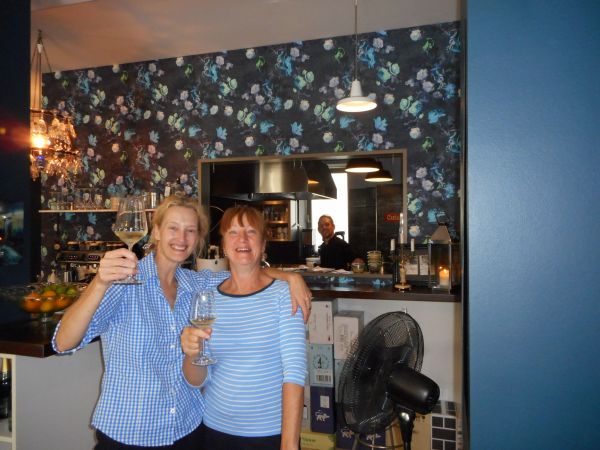
Friendly waitresses at Ballenberger
My friends Antje and Jens Bauer took me to the Waldkasino, located at the edge of the Steigerwald, a forest-park south of Erfurt, criss-crossed with hiking trails. Great-great-great-grandfather Johann Blasius Siegling prowled this forest as a boy, studying the plants and animals. One of the trails, the Sieglingsweg, is named for him.
We left the Bauers' home and walked up one of the trails to the Waldkasino, ascending perhaps 600 feet to the summit. The location of the Waldkasino rewards guests with a stupendous view across the Thüringer Becken (in English, the Thuringian Basin), except that the tower-apartments from the Communist-era obstruct the view of Erfurt.
Antje and Jens were perfect hosts, and I enjoyed my time with them very much. I can't say enough how much I enjoyed dining at the Waldkasino. So many nice things to eat and drink. Prosecco and beer during the meal, Ramazotti or Sambucca afterward.
A visitor like myself has to take stock of the drinking options at some point, or go home plastered every night. The next photo shows me ruefully contemplating this problem.
In Germany, I eat as the Germans do, with the fork in the left hand, the knife in my right--hidden behind my Bier-krug.

